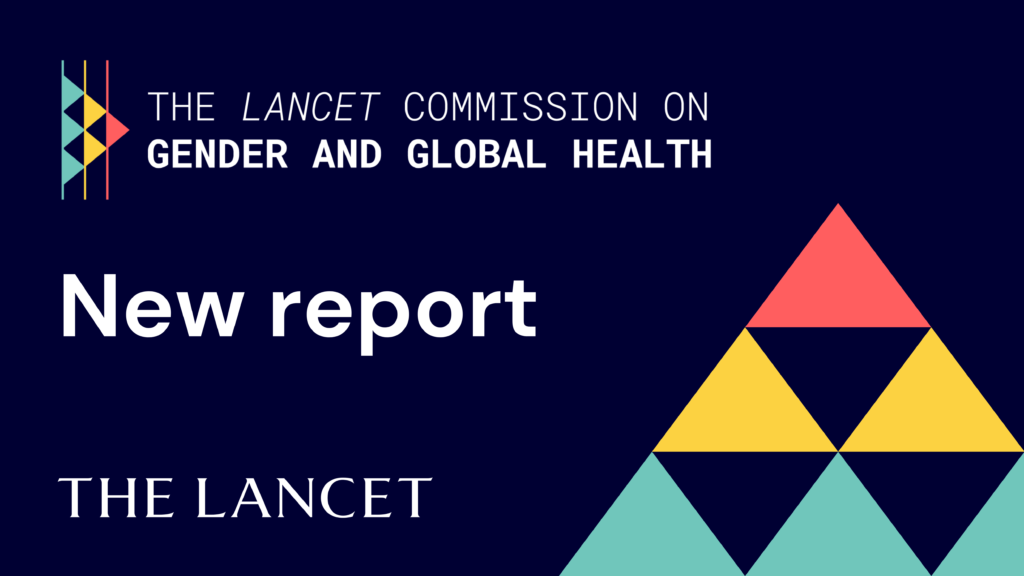
Transformational Moment for Gender and Global Health
On World Health Day 2025, the Lancet Commission on Gender and Global Health launched its landmark report at a global event in New Delhi, India, uniting Commissioners, researchers, policymakers, and the wider global health community.
The report offers bold, evidence-informed recommendations designed to drive meaningful change. It presents not only a compelling vision for a world where everyone can thrive, but also a practical toolkit for reimagining and transforming health systems to serve all people.
This Commission sets out a compelling and urgent case: achieving gender justice is fundamental to global health equity. It examines how gender is actively contested within health systems, and how anti-gender movements and commercial interests shape policies and outcomes in ways that entrench injustice. Drawing on historical, political, legal, and economic analysis, it explores how power operates through gender to determine whose health counts, who holds authority, and who benefits.
Global 50/50 (formerly Global Health 50/50) is proud to support the Commission. From co-chairing and co-authoring the report to contributing research and operational support, our team has been closely involved. Learn more about our role below.
We invite you to explore the Commission’s findings and join the movement for a healthier, more equitable world.
What Is the Lancet Commission on Gender and Global Health?
The Lancet Commission is a platform for change—bringing together global, multidisciplinary experts to address pressing health crises. This Commission calls for a paradigm shift in how gender is understood and addressed within global health systems.
Why now? Gender is a powerful determinant of health. Yet too often, it is misunderstood, sidelined, or weaponised. The Commission’s findings highlight how entrenched inequalities and anti-gender movements are threatening decades of progress.
But there is hope. With bold, practical recommendations for policymakers, practitioners, and advocates, the Commission presents a clear set of recommendations for action to achieve gender justice by 2030.

Why a Commission on Gender and Global Health?
We are facing a pivotal moment for global health and gender equality.
Across regions, we are witnessing a coordinated rollback of rights. Gender is being politicised and weaponised – used to divide, exclude and undermine progress.
This is not new, but it is accelerating. A well-funded, global anti-gender movement is gaining traction, while commercial actors continue to exploit harmful gender norms to promote health-damaging products and deepen inequalities.
Despite decades of evidence on the links between gender and health, global health systems have failed to act. There is no coherent strategy, no accountability, and no urgency.
The year 2025 marks a critical juncture. With anti-gender ideologies on the rise, the upcoming G7 summit placing gender equality back on the global agenda, and the anniversary of the Beijing Declaration serving as a moment for reflection and recommitment, the need for clarity, coordination and action has never been greater.
The Lancet Commission responds to this crisis. It offers a clear, coordinated set of tools and strategies for reform. It moves beyond rhetoric and research—to action.
This is not a time for more analysis. It is a time to confront injustice and reimagine health systems that deliver for all people, equally.
Our Role in the Commission
Global 50/50 is proud to have supported the Lancet Commission on Gender and Global Health throughout its development—providing financial, strategic, and operational contributions, as well as intellectual leadership.
Our involvement includes:
- Co-leadership: The Commission is co-chaired by Professor Sarah Hawkes, Co-Founder and Co-CEO of Global 50/50, alongside Elhadj As Sy, Chair of the Kofi Annan Foundation and former Secretary General of the IFRC.
- Research contribution: Our Health Lead, Lynsey Robinson, and Global 50/50 researcher, Aaron Koay, contributed to the evidence base and served as co-authors of the final report, with Professor Kent Buse acting as a Senior Advisor to the Commission. Other Global 50/50 researchers provided evidence, data and academic support to the Commission across a number of disciplines.
- Evidence and insight: The report draws on Global 50/50’s pioneering research, including our Annual Health Reports, our COVID data tracker and policy analysis and the newly launched Gendered Health Pathways initiative, which explores how gender intersects with key conditions such as hypertension, diabetes, and HIV.
- Support throughout: From early-stage scoping to global launch, Global 50/50 played a supportive role in the Commission’s development and delivery.
Our contributions reflect our longstanding commitment to advancing gender equality through rigorous, accessible data and accountability.
Meet the People Behind the Commission
The Lancet Commission on Gender and Global Health is co-chaired by Professor Sarah Hawkes and Elhadj As Sy, and brings together a diverse group of 18 Commissioners and 6 authors each with deep expertise across a range of disciplines including law, history, political analysis, economic analysis, sociology, and health sciences, and representing policy-makers, practitioners and community activism. This work was supported by a dedicated Secretariat and shaped by wide-reaching public engagement that amplified diverse voices, experiences, and scholarship across regions.
The Commission was funded by the Wellcome Trust, Ford Foundation, and Global 50/50, and Secretariat support was provided by University College London and United Nations University International Institute for Global Health.
A new era for global health starts here. Help us make gender justice the foundation of healthier, fairer societies.
Join the Conversation
From Delhi to Dakar, São Paulo to Adelaide , the Commission is being launched across the globe in 2025. Join us in these conversations as we explore the critical questions the Commission raises—and spotlight the opportunities it presents.


